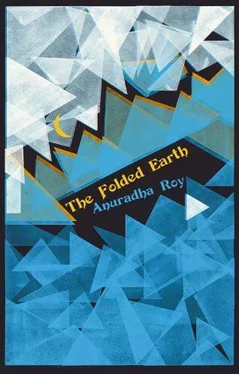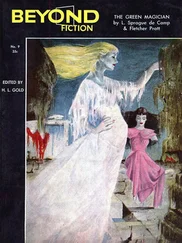In the rear-view mirror, his eyes gleamed. When Charu inadvertently looked towards the mirror, she met his eyes, which he narrowed and winked. She quickly looked away, towards the woman on the next seat, who nodded at her over the toddler in her arms. The child gave Charu a wide, three-tooth smile. He put out a dimpled hand and clutched a fistful of her hair, pulling with all his might. Charu gasped. The woman gave the child a sharp slap and said, “I’ve told him, and told him, and told him, don’t pull hair, but does he listen?” Her shrill voice rose above the noise of the wheezing bus. “What a wicked child. Not mine, or I would have taught him a thing or two; my sister-in-law’s, you know, she’ll ruin him with her love, a boy after three girls, so what can one do?” She pinched the child on its arm and ordered, “Say Namaste to Didi, you wicked boy.”
Charu looked out of her window and saw they were passing a waterfall. She wished she could wash her feet in its sparkle. The woman resumed: “Sometimes he vomits because he feels sick on these hill roads. If you give him the window seat, we will all be at peace.” The child bawled, as if on cue. “He just wants to look out of the window.” This time the woman sounded as if she was accusing Charu of making him cry.
Charu said, “I am used to crying babies. It makes no difference to me.” She turned away. She could sense the woman’s peevish looks but she was inured to such things. She leaned her head on the window rails and shut her eyes.
The bus stopped at two points for people to buy food, drink tea, and use the bushes. Charu rushed in and out of the bus at those stops, afraid of losing her seat. She ate the last of her roti and jaggery and spent two rupees buying a glass of tea. It came in a tiny plastic cup. She could hardly hold it for the heat, but the tea was thick and sweet and she felt revived by the few sips the cup contained.
Once the bus left the hills behind, it began to hurtle at high speed. The roads were wider, though still bumpy, and there were fields on either side as far as the eye could see. Charu had never seen land so flat and endless. You might walk the whole day and never have to go up or down a slope. She wondered how that would feel.
When the bus went through one of the many small towns on the way, she saw no fields, only white dust, and the sun felt as if it would burn through her skin. Every house was a grim square of concrete. Drains on the road’s sides brimmed with an oily sludge. It was dirtier and poorer than the dirtiest and poorest part of Ranikhet’s bazaar. How did people live like that, she wondered? Fat flies buzzed over mounds of bright orange jalebis and samosas on handcarts selling food. Dust and piss everywhere; the bus churning up black mud as it bludgeoned its way through the crowds.
Once or twice they drove through market fairs, and Charu’s eyes tore at whatever they could as the bus swayed between rows of vendors who had laid out their goods on squares of sacking at the road’s edge: heaps of dry red chillies, cascading mounds of tomatoes, T-shirts in a hundred colours, glittering saris, dried turmeric sticks, stacks of bottle gourd, plastic shoes. They passed tractors filled with the sugarcane harvest, bullocks being sold at a cattle fair, mangled cars and trucks left over from recent accidents, their wheels still pointing to the sky. They stopped at toll-gates where boys came up to the window to sell plastic pouches of water, fried papad, roasted gram, sliced cucumbers, and coconut. Charu fished out another two of her precious rupees and bought a hot, sour packet of the gram sprinkled with raw onions and tomatoes. For some time she sat holding it, letting its aroma come to her, feeling her mouth water. The woman next to her picked some of the gram out from the packet, and tossed it into her mouth. “Good,” she said. “It’s good.” Charu was outraged. The packet was tiny, and now a whole mouthful was gone. Before the woman took more, Charu tucked her packet out of reach, hiding it between herself and the window, surreptitiously picking out one grain at a time to suck on.
They went over bridges and through traffic jams. When they crossed the Ganga at Garh Mukteshwar, the bus slowed, then came to a stop in a traffic jam. Many passengers clamoured for it to remain on the bridge so they could run down and throw coins into the holy water, but the driver threatened, “Anyone who gets off will be left behind.” The woman next to Charu leaned right across her to the window, bowed her head, bumped it against the window grille again and again and murmured, “Hari Om, Hari Om.” Charu could smell the woman’s stale nylon sweat. Nobody smelled like that in the hills.
The river, though very wide, looked shallow. There were people in it, and the water came only up to their waists. Low steps led away from the water to the banks, which had rows of temples as far as her eye could see. The steps were crowded with sadhus, priests, people praying. One of the temples had a clock in a tall tower, its hands stalled at five-twenty. The river water below it was still as well.
“Water in the hills flows very fast,” Charu said, almost to herself. “You can be washed away in it.”
The woman moved away and said, “This is our mighty Ganga-ji, not a little river in the hills.” Then she repeated, “Hari OM!”
In the late afternoon, after crawling through two traffic jams, they were in Delhi.
* * *
Charu had thought she would be awed by a big city, but already, along the journey, before they had quite reached Delhi, she had got used to tall buildings and roads that were like five rivers of cars joined into one. She felt a sense of familiarity. She had seen such roads on T.V. She realised she knew big cities from films and pictures in magazines.
What she was not prepared for was the stench. It smelt of putrid things, filthy drains, sewage, burning rubber, and smoke from factories. The stench came in through the windows of the bus, it was all around and she could hardly draw breath without coughing. She had not been prepared for the sky. She had thought skies were blue everywhere, as grass was green or red roses red; but here the sky was the slate grey colour of village roofs, only dirtier. You could not see far at all, just till the next few towering pillars of buildings, which stood close together like walls with square holes. They all looked the same, and as if they would fall any moment. Beyond, there was a haze of smoke. What kind of house did Kundan live in? she wondered. One of those?
The woman sitting next to her had told her they were getting off at a place called Anand Vihar Bus Terminus. “Where do you have to go?” the woman had asked her, but Charu had ignored the question, not trusting a stranger. She kept feeling the place on her chest where her cloth bag nestled under her dupatta, with the bulk of her money and her mother’s nose ring. She was now more apprehensive than she had been at any point in her entire journey. As the bus drew into the terminus, the strangeness of the new city became terrifyingly real.
Crowds of people bore down on the slowing bus. They were running alongside the bus, banging it with their hands, shouting. Some hauled themselves up by the window rods, and hung from them, pressing their faces to the windows. One face said, “Auto, auto,” the other face said, “Rickshaw? Tempo? Where to?” Her eyes scoured what little she could see beyond the crowds of men at the windows and doors. The bus stop was a vast cemented area, with bay after bay for buses from various states. All the hills buses came into Bay 12, and Charu’s bus too headed for it. Any minute now, she thought, she would see that loved, familiar face. He would appear, pick up her bundle, and take her home. He would hold her hand in the auto.
Читать дальше












